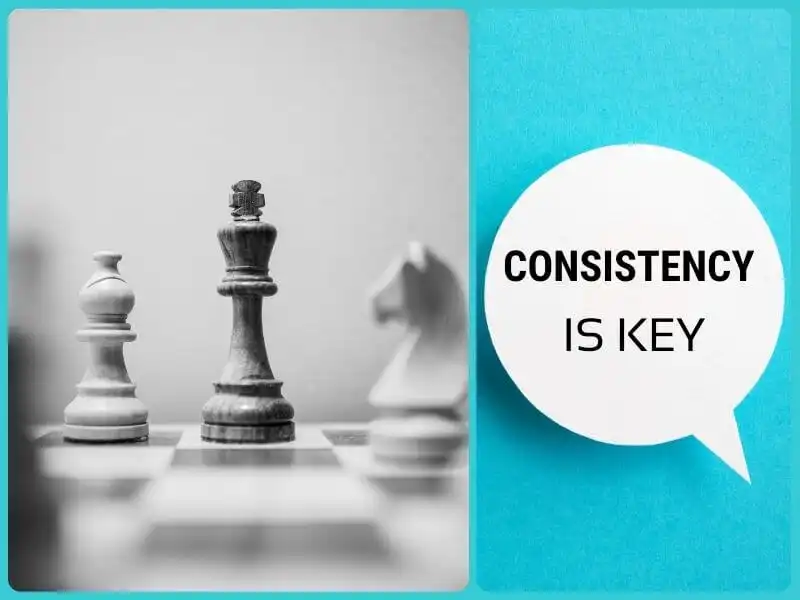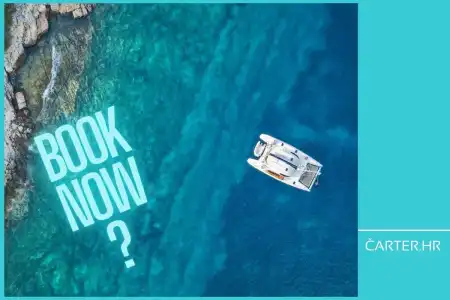
- 19.08.2024.
- News, Marketing, Management
Running a successful yacht charter business is more than just preparing for the next sailing season, offering vessels and recommending picturesque destinations. Consistency is the key, as in any business. Your future guests are looking for reliability and specific (high) standards.
If anything is vital to your business, consistency is key to your success.
Consistent practices ensure that future guests know what to expect. Over time, consistency builds trust and loyalty.
For yacht charter companies in Croatia, consistency takes on additional importance. Croatia's popularity as a top yachting destination means that competition is fierce.
If you deliver a consistent experience, from the moment a potential guest inquires about a vessel to the check-out as your (satisfied) guests, this is where you will stand out.
First - you must have a strong and consistent brand
A strong and consistent brand is the foundation of every business, including your yacht charter business.
Truthfully, these things are often forgotten in the hustle of the peak sailing season.
However, consistency is the key – it differentiates you from competitors and makes your services memorable to clients.
Consistency is closely connected to the brand, so establish a recognisable brand identity. Keep in mind that it's not just about having a unique logo or an up-to-date website—it's more than that.
It's about creating a cohesive experience that reflects your company's values at all times.
To achieve this, all your brand's touchpoints, whether online or offline, must align with its core values and image.
This means your messaging, visual elements, and even the tone used in communications should be uniform across all platforms and customer interactions.
Consistency in branding builds trust. This is invaluable in the yacht charter industry, where people invest in their experiences.
Examples of consistency in branding:
- Using the same colours and logo across your website, social media, brochures, and yachts.
- Customer service team that communicates in a uniform tone that reflects your brand's personality—whether friendly or formal.
- Marketing materials and content that consistently highlight your brand's unique selling points, like unparalleled customer service.
- Providing personalised, branded welcome packs or souvenirs.
- Consistent quality in yacht maintenance and presentation that shows your commitment to excellence.

Consistency is key to success of your customer service
Delivering consistent, high-quality customer service is non-negotiable in the yacht charter business.
Your guests come with high expectations, and consistently meeting those expectations turns a one-time booking into a long-term loyalty.
Consistency in service is much more than just being polite or responsive.
Whether it's the initial inquiry, the booking process, or the onboard experience—it must reflect the same standards of excellence.
This uniformity makes your business more reliable in the eyes of your clients and streamlines operations, as your team knows exactly what is expected of them at every stage.
Examples of consistent customer service:
- Responding to inquiries within a set timeframe so the client doesn't feel overlooked.
- Offering the same level of attention to detail regardless of the yacht type or charter duration.
- Providing personalised service, such as remembering client preferences and anticipating their needs.
- Ensuring every yacht in your fleet is presented with the same attention to cleanliness and preparedness.
- Following up with guests to thank them and gather feedback, reinforcing your commitment to their satisfaction.

Consistency is standardising your fleet maintenance and presentation
The condition and appearance of your fleet speak much about your business.
Your guests expect much from you and your vessels when they step on board, which is why you must standardise your fleet's maintenance and presentation.
Make sure every yacht in your fleet is always in top condition. This means taking care of all mechanical and safety aspects, as well as the small details that contribute to a luxurious experience.
Consistency in presentation is equally important. Every yacht should be immaculate, from deck to the interior. This uniformity reassures your guests that they'll receive the same high standard of service, no matter which yacht they choose.
Examples of standardised fleet maintenance and presentation:
- Implementing a maintenance checklist that covers everything from engine checks to the condition of onboard amenities.
- Scheduling regular deep cleanings for each yacht, ensuring that every surface, linen, and fixture is spotless.
- Staff following strict and detailed guidelines for yacht setup.
- Conduct quality control checks before every charter to verify that all systems are operational and that the yacht is in perfect condition.
- Providing guests with a consistent onboard experience, whether it's the quality of the bedding or welcome amenities.
Be consistent in pricing and booking processes
Consistency is key in pricing and booking processes also. It's all about building trust and ensuring a smooth experience for your guests.
A transparent and uniform pricing strategy eliminates any confusion or surprises, which is essential when people are making a significant investment in their vacation. When your future guests know exactly what they're paying for, it fosters a sense of trust that can lead to repeat bookings and positive word-of-mouth.
Streamlining the booking process is equally important. A seamless booking experience saves time for your guests and your team and lessens the chances of errors or miscommunications.
Examples of consistent pricing and booking:
- Offering clear, itemised pricing on your website or in your brochures so guests know exactly what's included and what costs extra.
- Using a standardised booking system that allows people to easily select their preferred yacht, dates, and any additional services.
- Providing a detailed confirmation email after booking that outlines all the terms, conditions, and what your future guests can expect.
- Ensuring that any special offers or discounts are clearly communicated and applied uniformly across all bookings.
- Implementing a straightforward cancellation and refund policy that's easy for people to understand and follow.

Consistency is key in marketing and communications
Consistency in marketing and communications is all about ensuring that your brand's message is clear, reliable, and always aligned with your company's values.
Maintaining a uniform message across all marketing channels boosts your brand identity, making it easier for potential guests to recognise and remember you.
Whether on your website, social media, or in print materials, every communication should speak the same language and tell the same story.
Regular updates and communication with your audience are also vital. Establishing a presence is not enough; you need to keep the conversation going.
Consistent communication shows people that you're engaged and attentive to their needs, whether they're just browsing or have previously chartered with you.
Examples of consistent marketing and communications:
- Using the same tone and messaging in all advertising materials, whether a social media post, an email newsletter, or a brochure.
- Keeping your website content updated with the latest offers, fleet details, and client testimonials to ensure accuracy and relevance.
- Sending regular newsletters that provide valuable content, such as tips for a better charter experience or updates on new yachts and must-visit destinations.
- Ensuring that your customer service team is briefed on current marketing campaigns, so they can reinforce the same messages in their interactions with clients.
- Consistently engaging with followers on social media, responding to comments and messages, and keeping them informed about what's happening with your company.
Consistency is key to your team's success
Your team is the heart of your yacht charter business, and their ability to deliver consistent service can significantly impact your overall success.
It is crucial to train your staff to uphold the same standards across all interactions. Whether it's how they greet clients, manage onboard requests, or handle unexpected situations, consistency in their performance ensures that every guest receives the same quality experience, regardless of who they interact with.
To achieve this, create standardised procedures.
These guidelines will provide your team with a clear protocol, reducing the risk of errors and making sure everyone is on the same page.
When your team knows exactly what is expected of them, it improves overall efficiency, making your operations smoother and more reliable.
Examples of consistency in team training and procedures:
- Developing an onboarding program for new hires that covers everything from customer service etiquette to emergency protocols.
- Having regular staff meetings to keep all team members updated on new practices and company standards.
- Creating detailed checklists for pre-charter preparations, ensuring that every aspect of the yacht is ready before guests arrive.
- Establishing a uniform process for handling guests’ feedback, so issues are addressed consistently and professionally.
- Encouraging open communication within the team ensures everyone is aware of their responsibilities and any procedure updates.
Measuring and adapting for continuous improvement
For your yacht charter business, it's essential to regularly measure performance and adapt your strategies based on the information you gather.
By actively listening to your guests and analysing data, you can identify what's working well and where there's room for improvement.
This ensures that your service remains consistent while still evolving to meet client expectations.
Adjusting strategies doesn't mean overhauling everything; you should (just) fine-tune your operations while keeping your core practices intact.
It's important to know that these adjustments should enhance the guests' experience without compromising the consistency that they have come to expect.
Examples of measuring and adapting:
- Sending out post-charter surveys to gather feedback on their experience, then using that data to make targeted improvements.
- Monitoring repeat booking rates and guest reviews to assess the effectiveness of your service consistency.
- Analysing trends and guest’s preferences to adjust your offer or add new amenities that align with their desires.
- Implementing a continuous improvement plan, where small, consistent updates are made to enhance your service.

The impact of consistency on long-term success
Consistency is a must in the yacht charter industry; a fundamental driver of customer satisfaction and long-term business growth.
When your guests know they can rely on your business to deliver the same (and even better) service every time, it builds trust. It also encourages repeat bookings, and that should be your goal.
Trust extends beyond just one positive experience—it creates a reputation for your yacht charter as reliable. And reputation is everything.
Consistency should be a practice implemented across all aspects of your business, from customer service to fleet maintenance and marketing.
For sustained success, don't make radical changes outside your comfort zone in the hope of overnight achieving something you didn't have.
Make meaningful and valuable changes for your company, team, and guests.
If you need help streamlining your work processes so your yacht charter company functions smoothly (and even predictably) day in and day out, contact us without hesitation.
Categories of trends
- News
- Sale
- Marketing
- SEO
- Web design
- Social media
- Technology
- Regulations
- Management
- Education
- Finances
- User experience
Newsletter
Sign up for the newsletter and receive the latest trends and tips straight to your inbox



